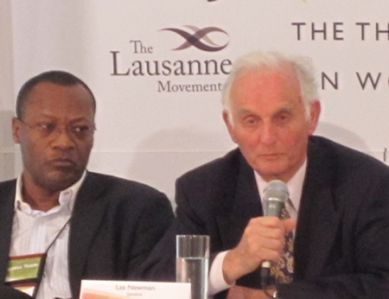Lausanne Movement Addresses Creation Care

Creation care and the effects of climate change –issues long considered to be ecumenical concerns - were discussed by evangelical leaders this week during panel sessions at the Cape Town 2010 conference.
"The subject of the environmental crisis and our Christian witness is something that not only the Lausanne Movement needs to be concerned about, but every person in the world who calls themselves a Christian needs to be concerned about," said Dr. Las Newman, President of the Caribbean Graduate School of Theology in Kingston, Jamaica.
"This is a moral challenge, a huge moral challenge, before us as we face the reality of climate science and the science of climate change," he continued. "There is a moral responsibility for us not to ignore this issue but to take it seriously and to deal with it urgently."
Newman and his co-panelists -Dr. Ken Gnanakan, president of the ACTS Group of Institutions in India; Dr. Denise Thompson, professor at the University of Trinidad and Tobago; and Sir John Houghton, former co-chair of the U.N. Intergovernmental Panel on Climate Change- spoke multiple times on Tuesday and Wednesday, stressing the importance of the church being able to formulate a response to the climate crisis, which they explained is already having serious effects in different parts of the world.
"It's a crucial issue because it's affecting the world, it's affecting eco-systems, and it's affecting God's creation, and above all it's affecting the poor and will affect the poor more than anything," said Houghton at a press conference on Tuesday.
"We read a great deal in the Bible about caring for the poor," Houghton said. "So there's an enormous moral imperative, a Christian imperative, to those of us in rich countries to take the problem seriously and to cut down emissions as fast as we can."
Responses to the climate crisis were given by Cape Town attendees during a panel session on Wednesday afternoon with participants touching on both the practical and spiritual sides of the debate.
"Are there new paradigms (in academia) of support for research that makes a difference?" asked Thompson. "Are there new paradigms in business for making choices that make a difference?"
"Can you make choices about allocating part of your portfolio for clean projects, for clean businesses? Those are choices you can make on a day to day basis," she said.
Danny McCain, a professor of biblical theology at the University of Jos in Nigeria, stressed the importance of addressing the environment from the pulpit as he recounted a story of how a sermon he had preached years back on protecting the environment had inspired a would-be governor to strive to make the Plateau State the "cleanest and most environmental friendly state in this country."
"You all have pastors, you need to go to your pastors and insist that this is part of the gospel," McCain said. "That is the most basic fundamental thing that any of us as Christians can do is work through our pastors and local churches to get this theological message to the heart."
The conversation comes as global leaders are set to convene a major conference on climate change in December in Cancún, México – the first since the Copenhagen debacle last winter.
U.N. Secretary-General Ban Ki-moon admitted on Monday that he doesn't expect a "breakthrough" to happen in Cancún, although he added that "tangible" progress has been made throughout 2010 in negotiating climate issues.
"We are not giving up, we are working very hard, we are moving ahead," Ban said.
The U.N. released a report on Monday underscoring the importance of nature to the economic bottom lines of businesses, adding more scientific backing to importance of addressing creation care.
"The economic invisibility of nature is a problem," said the report's chief author, Pavan Sukhdev. "This is not just an issue for one species. This is actually a problem for human well-being."